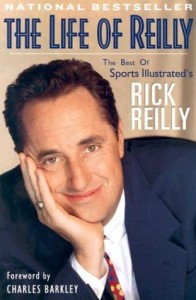Here we are: the highest ranking member of the list of semi-inspiring critics/websites/writers/comedians/bloggers that have peppered my list and have earned my respect by being different and independent and cool.
Except Rick Reilly isn’t cool. In fact, he’s sportswriting’s Public Enemy No. 1 (if I am to trust the anecdotal things I read online). Chances are that if the name “Rick Reilly” is meaningful to you, you probably actively dislike the now semi-retired writer.
And I get it. His columns recently have felt pretty phoned in, rehashing, and cheesy. He’s an eye-roll-inducing hyperbole-speaker whose idea of analysis is some jokes about dentistry.
But let me ask you this: When LeBron James is 39 and putting up 4-for-22, 9 point, 2 rebound clunkers, will you really consider him any less great?
Obviously it’s not a perfect analogy, because writers are supposed to grow BETTER as they grow older and wiser. But the point stands that Rick Reilly used to be great. REALLY great. He was a Roman candle in the dull, predictable world of sports writing.
Back before the internet gave us unprecedented insight into the lives and relationships of athletes — and the impact sports had on regular people — Rick Reilly was pretty much the only person asking “why” when most sportswriters were concerned with the “what” and “when” of it all.
And he did it without the virtually infinite word count limits that the Internet provides us.
Even Deadspin, his biggest critic, admits that Reilly used to be a titan in sportswriting.
You hop around any sports news site, even big guys like ESPN, and you get heavy doses of personal, conversational pieces that deal with the “human side” of sports. Most of those guys learned how to do it by reading the back page of Sports Illustrated where Reilly lived during his glory years.
S ure, he’s sometimes hokey and punny like your annoying uncle. But, damn if he’s not incredible at telling stories and invoking emotions at his peak writing power. He could incite your awe and anger. He was the one who made you pissed off at Jayson Williams and Sammy Sosa. He made you really understand how much of a psychotic golf genius Tiger Woods is and how deranged and destructive former Reds owner Marge Schott was.
ure, he’s sometimes hokey and punny like your annoying uncle. But, damn if he’s not incredible at telling stories and invoking emotions at his peak writing power. He could incite your awe and anger. He was the one who made you pissed off at Jayson Williams and Sammy Sosa. He made you really understand how much of a psychotic golf genius Tiger Woods is and how deranged and destructive former Reds owner Marge Schott was.
Rick Reilly was also the one to remind you how sports affected — often reflected — “the real world.” He wrote two fantastic stories about coaches at Columbine, including a tearjerker about the high school’s women’s basketball coach, and he made us care about paraplegic former football star Doak Walker .
And, even when he couldn’t find anything in particular to write about, he still wrote the freaking crap out of his columns. His rant about what makes sports great — framed as a discussion with his kid — is an all-time semi-nonsense classic.
As you can see, I have absolutely no shame worshipping at the altar of Reilly, his flaws be damned. This was the guy who made me want to write — and be a sportswriter, specifically, which I did while in college. His peak material is timeless, world-class sportswriting. (He’s also, I’ve failed to mention, freaking hilarious from time to time. His “Swooshification” article is first-rate satire.)
 I seriously consider the book collecting the best of his early SI work (The Life of Reilly) one of my ten or fifteen favorite books ever. I recommend it to pretty much anyone. Its follow up, Hate Mail from Cheerleaders, is not half bad either.
I seriously consider the book collecting the best of his early SI work (The Life of Reilly) one of my ten or fifteen favorite books ever. I recommend it to pretty much anyone. Its follow up, Hate Mail from Cheerleaders, is not half bad either.
Hell, his writing is a large part of why I love sports, period. Time and again, he convinced me that these trivial games are worth giving a damn about.
So the Deadspins of the world can curse his name and his writing style that looks increasingly contrived and exhausted. But those of us who give a crap about sports and storytelling, and who are willing to look backwards more than five years, will find one of the best sportswriters who ever lived.





